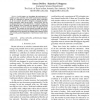Free Online Productivity Tools
i2Speak
i2Symbol
i2OCR
iTex2Img
iWeb2Print
iWeb2Shot
i2Type
iPdf2Split
iPdf2Merge
i2Bopomofo
i2Arabic
i2Style
i2Image
i2PDF
iLatex2Rtf
Sci2ools
119
click to vote
ICWN
2004
2004
Sustaining Performance Under Traffic Overload
In this paper, we investigate the performance of wireless ad hoc networks with traffic loads beyond saturation. While it is desirable to operate a network below saturation, an ad hoc network should be designed to degrade its performance gracefully under severe loads. Using AODV (ad hoc on-demand distance vector) and 802.11 as example routing and MAC (Medium Access Control) level protocols, we show that the throughput of an ad hoc network drops off rapidly beyond saturation. The reasons for this behavior are high route maintenance overhead and increased radio interference. We propose modifications to the protocols to mitigate these negative factors and provide graceful degradation of performance under heavy loads.
Related Content
| Added | 31 Oct 2010 |
| Updated | 31 Oct 2010 |
| Type | Conference |
| Year | 2004 |
| Where | ICWN |
| Authors | Saman Desilva, Rajendra V. Boppana |
Comments (0)

